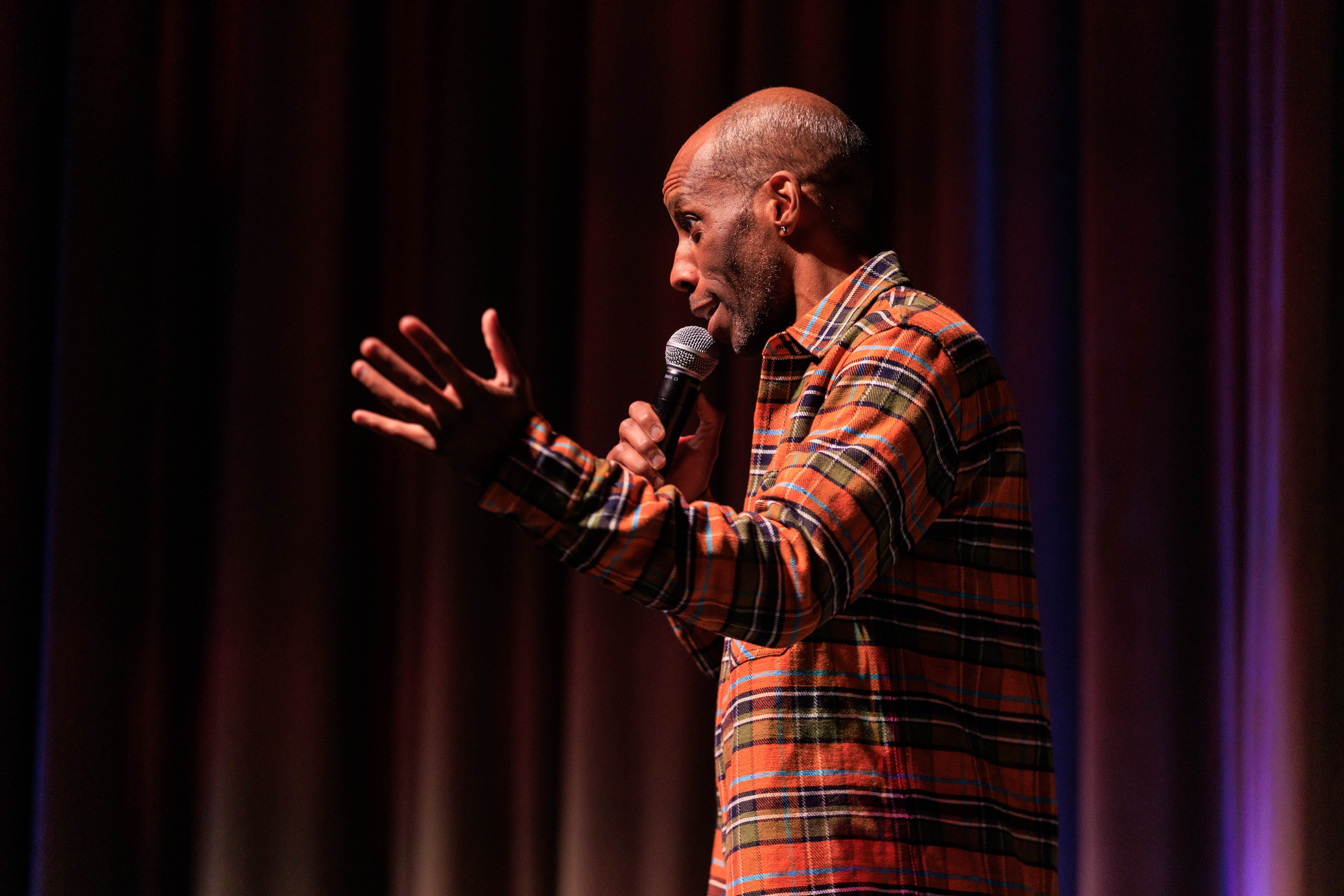Stand-up comedian Suli McCullough is still in shock about Will Smith slapping Chris Rock at the Oscars. As one of the writers for the 94th Academy Awards, McCullough was expecting it to be the greatest night of his life. But after one of the jokes they’d penned rolled out of Chris Rock’s mouth, leading Will Smith to get on stage and slap him, all of his work was derailed.
McCullough appeared at Bing Studio on Thursday for an hour-long stand-up show where he discussed being a single dad, his sneaker collection, an awful job at McDonald’s and the fallout of the infamous Oscars slap. He’d share parts of his life that were seemingly traumatic, and spin them into lighthearted, slightly dark jokes.
“Here’s my takeaway from what happened that night: Jada Pinkett Smith has alopecia, and I still have awards show PTSD,” he shared with the small audience.
Known for playing Dwayne “Mouse” Abercromie on The Jamie Foxx Show, McCullough has also written for the Tonight Show with Jay Leno, American Music Awards and the Emmys, in addition to last year’s Academy Awards. Before those achievements, he grew up in the Bay Area. Wearing skinny jeans and a red and black flannel (in boy’s size medium), McCullough started the show by sharing that he used to work at the Stanford Shopping Center and attended Cupertino High School.
“There’s no way to make that shit sound hard. You know what I mean? It just sounds fucking happy. ‘I went to Cupertino,’” he said. He inadvertently hammered home his roots in the area when he asked a man sitting in the front row what he did, and the man revealed he was one of McCullough’s former junior high classmates.
Now Suli McCullough is a single dad, though “more dad than single right now,” he stressed. He joked that when he helped his daughter move out of Spelman College at the beginning of the pandemic, he almost got with one of her classmates. The bit dragged on a little from some extra details about the college and the Atlanta airport, but the punchline brought uproarious laughter from the audience: he resisted because he “was having a hard enough time paying for one college tuition.”
McCullough’s strength was his frequent and laid-back interactions with the small audience; a fourth wall was never even constructed between us and him. Before most bits, he polled the audience to see who’d be able to relate to it.
“Clap if you got whooped with a belt,” he said before sharing that his mom would belt him and his friends growing up. The majority of the room didn’t clap, so he quipped, “Apparently, time-out is how you get to Stanford. Belts? San Jose State,” referring to the university he attended before transferring to UCLA.
At one point, he invited audience members to share their bad job experiences, reacting in real time along with the rest of us. His casual, relatable delivery and the Stanford ties he established at the start of his set made me feel like I was watching a regular person — albeit far above average in humor — who just happened to be batting around on stage.
In a past life, he had a terrible work experience at McDonald’s, which he described as a “no-women-getting” job. To illustrate just how bad it was, he acted out entertaining impressions of female McDonald’s employees rejecting him, his coworker who tried to stab his manager and the manager who still needed the coworker to cover Big Mac Mondays.
Towards the end of his show, McCullough invited audience members to ask him questions, which elicited thoughtful answers about the nature of being a comedian. He shared what percentage of his routine was real (most of it), his favorite celebrity interactions (“Hannibal Lecter was such a nice guy,” he said regarding Anthony Hopkins who played the role) and how to become funny (check out his documentary “Dying Laughing”).
When asked if he had dealt with writer’s block, he revealed to us that he was once assaulted by a racist neighbor who accused him of stealing their phone, and though he had tried to write about it for a while, he hadn’t figured out how to make that story funny yet.
McCullough, and many comedians, are constrained in that way. When they share something vulnerable, something traumatic on stage, it still has to be served with a joke. As a comedian, McCullough is deft at getting people to laugh about unpleasant topics like corporal punishment and bad jobs. His experiences with that happened a while ago; they’re distant from the successful comic he is now.
But tackling a serious and sensitive transgression in a comedy act is a challenge for any comedian, including McCullough. Pulling it off would make McCullough’s show even more memorable, inviting the audience to participate in comedy as a collective healing process.
Editor’s Note: This article is a review and includes subjective thoughts, opinions and critiques.
